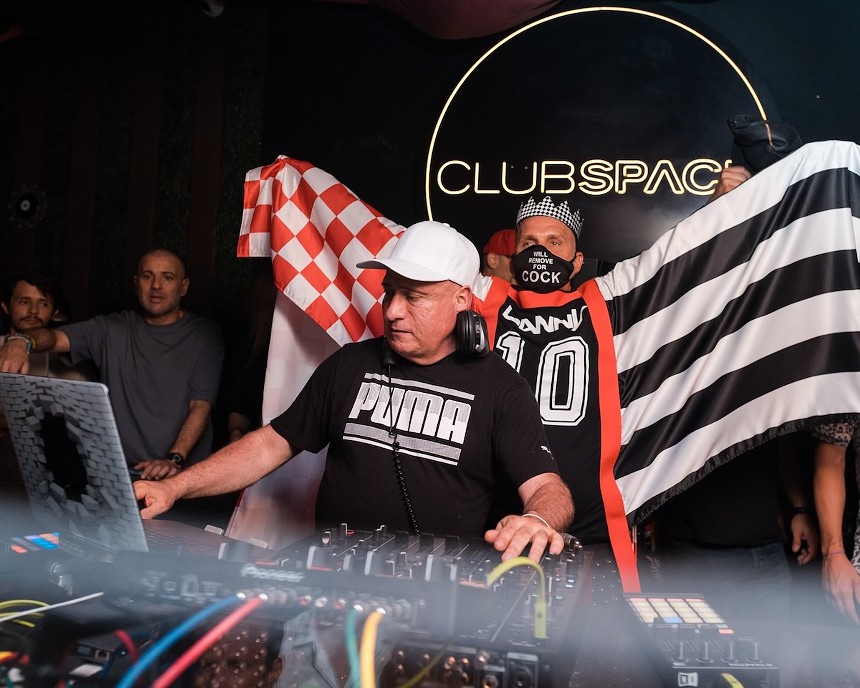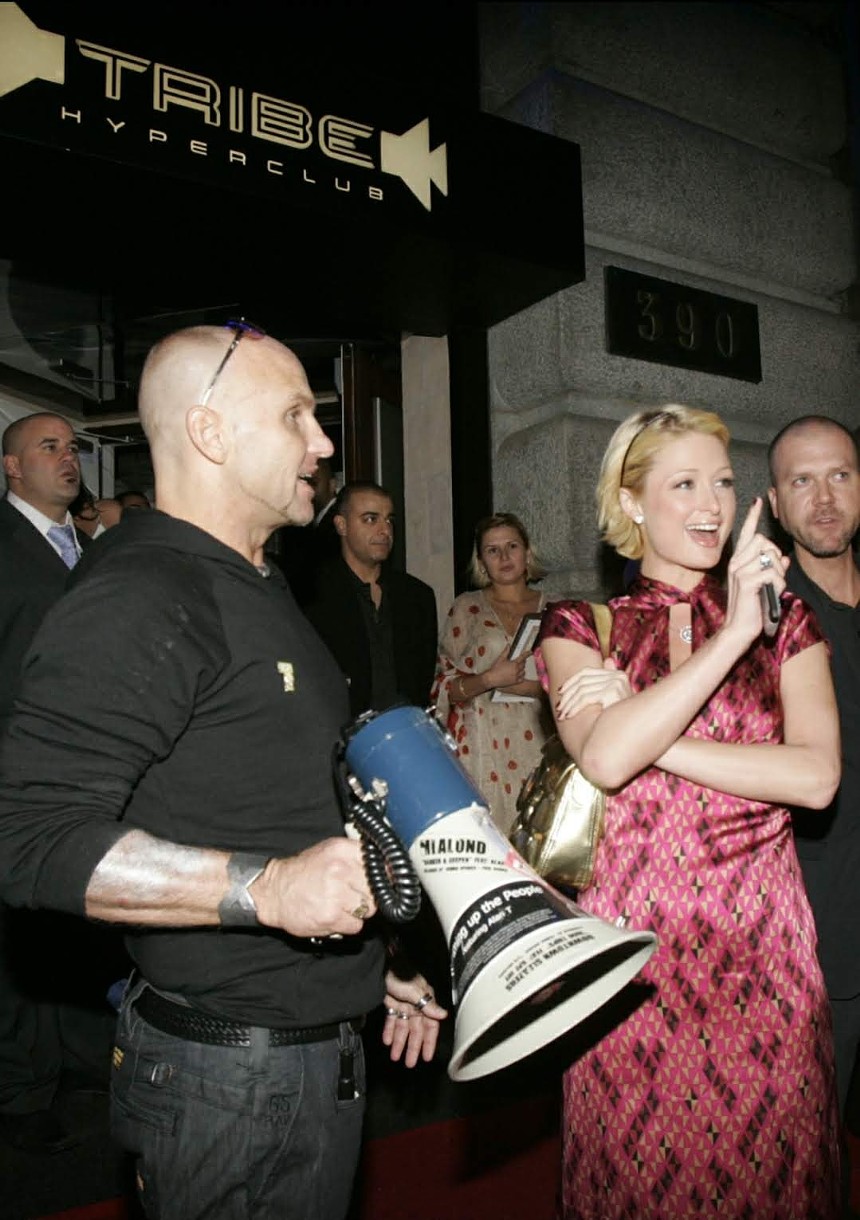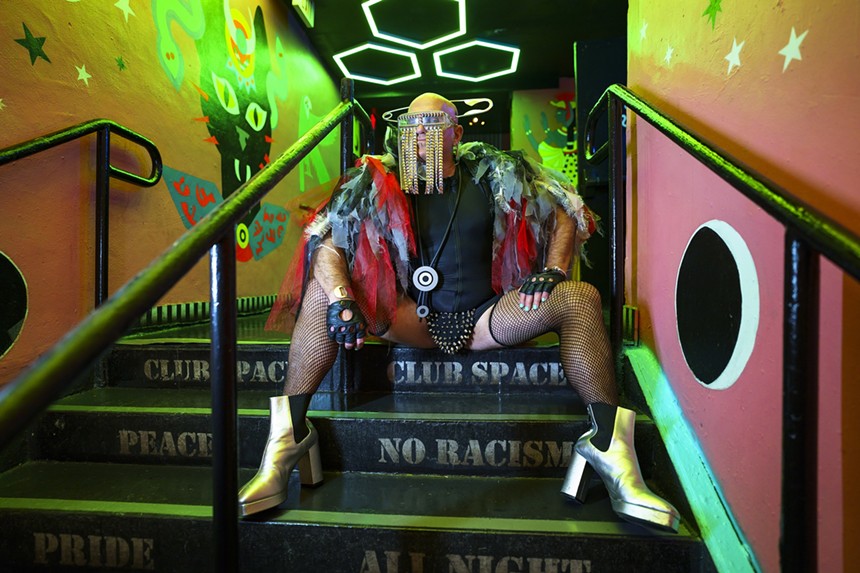Club Space Doorman Alan T Is a Miami Nightlife Icon
[ad_1]
Where’d Alan T go?
It’s 2:30 a.m. on Friday of Miami Art Week, and there’s a phalanx of ravers, night-trippers, and British tourists traveling stateside to party like there’s no tomorrow. He should be at his post at the door of downtown Miami club Floyd.
The damp nighttime air smells of spray paint, cigarette smoke, and spilled beer as a swarm of twenty-something ladies from Los Angeles approach the velvet ropes. They throw out a complicated soliloquy of names, hoping to get inside.
Alan T is hard to miss. The 58-year-old rocks a shaved head with piercing green eyes that stick out of their sockets like he’s been waiting to tell you four decades’ worth of stories. He is stiff yet nimble enough to do a cancan kick and pirouette to the rhythm of the night. Usually known for his flamboyant outfits, tonight, he’s dressed conservatively, sporting a Dickies denim mechanic’s coverall with red and white paint splattered all over. Attached are long, black tassels that can whip when provoked. The ensemble is completed with a pair of black boots, a black chain as a necklace, and a scarf covered in spikes.
But instead of being at the door, Alan is inside the venue to catch Danny Daze, who is gearing up to drop the track “There’s Only One,” a 2008 collaboration by Lula and Alan T. It’s fine — Alan’s second in command, Gabby Bolano, can manage the door for a few minutes while he basks in the spotlight.
“There are songs that some DJs just hold dear to their heart,” Daze wrote on his Instagram the day after the show. “This is one of them being done by a hometown cohort. I’m glad to see remixes out, but nothing will top the original. One of those records I wish I’d made.”
Daze’s adoration for Alan T isn’t uncommon. You’d be pressed to find someone who has anything truly bad to say about him. For three decades, Alan has been guarding the velvet ropes at Miami’s most in-demand nightclubs and parties. His raspy voice and acerbic sense of humor are part of the fabric that makes the Magic City’s nightlife what it is. Even if you are turned away at the door — either for being too inebriated or not being on the list — it’s impossible not to laugh as he roasts you for not knowing better. As his close friends and family will tell you, Alan T is more than just a doorman; he’s a brother, a boyfriend, and — believe it or not — a caring guy who adds much value to those around him.
All in the Family
Alan Dale Tibaldeo’s entrance into the music scene came the day before Valentine’s Day in 1968, the day he was born.
His grandfather, Corrado, ran the family music store in New Haven, Connecticut, since the 1930s. Then, Alan’s father, Victor, took the family business to Miami after a vacation and, in 1958, founded and operated Victor Pianos & Organs at 200 NW 54th St. At its peak, there were seven shops throughout the city that stayed in business for more than six decades.
Alan’s older sister, Camille, tells New Times that every musician worth their salt would make their way to Victor Pianos & Organs during a stop in Miami. The Jackson 5 visited, and so did Billy Joel. Victor became so well-known that he occasionally took the bench to play alongside Frank Sinatra and Sammy Davis Jr. at the Fontainebleau. According to Alan, all of his father’s shops were spared during the Miami race riots in 1980, thanks to his father working with Black churches on their organs.
After Victor retired at 88 and his death five years later in 2016, Alan’s sister, Lisa DiRaimondo, ran the 54th Street location until its closing two years ago.
“Doing the door to the club is his stage, but if he were a singer or a DJ, he would be in Vegas.”
tweet this
Alan was never interested in taking over the family business. Instead, he attended the University of Miami, graduating with a bachelor’s degree in architecture in 1990. He then went on to earn his master’s of architecture at Columbia University in New York City.
George Krassas, Alan’s roommate at Columbia University and a New York City architect, remembers him as an erudite student. Alan could easily keep up with the pace, and Krassas believes that if he had stuck with it, he would have been among the greats. “I regret that he didn’t pursue architecture,” Krassas laments. “He would’ve been hugely famous considering his personality and talent. He was probably more talented than I was — and more free-willed.”
Alan took on projects after moving back to Miami but soon grew frustrated with the red tape and build-grand-but-cheap ethos, so he gave up his career in 1995. “It’s all grunt work. Even if you’re on your own, it’s impossible. Just getting people to say yes to a project is 40 percent of the work,” Alan says. “Not like when I went to live in Italy. I could just use what I learned in school and go with it.”
To Hell With It
Even as he was studying to become an architect, Alan always kept one foot in the nightlife scene. “I was going to Salvation, the Paradise Garage of Miami,” he says matter-of-factly.
While attending Columbia, he lived close to his sister Camille, who worked for a high-end art firm at the time. “I got a lot of knowledge from her; she knows everybody,” Alan says. “I would hang out outside her office and see all the celebrities: David Bowie, Grace Jones, and Blondie. It was the heyday.”
By the 1990s, Alan began working nightlife as a doorman and host at Miami Beach hot spots like Score and Liquid and events across the country, such as the late Peter Rauhofer’s Work! parties in New York City. You may think that being a doorman is an easy gig, simply choosing who you let into a party, but for Alan, it’s more complicated than that. “I think it’s somewhat on par with being a psychiatrist,” Alan explains. “You sort of have to psychoanalyze certain situations. You have to be a valet of sorts, providing a platform for people to have a good time.”
At the same time, Alan also made connections with the DJs visiting Miami, like Honey Dijon, Sasha & John Digweed, and Danny Tenaglia, all of whom often popped into Yesterday & Today Records’ former Alton Road location, where he also worked. “Danny would stay there for 21 hours sometime and just look for records,” Alan recalls.
“He’s a nightlife icon,” Tenaglia told New Times last year when the discussion turned to Alan. “He has many qualities and gifts: an eye for art and an ear for music, and his fashion is a statement each weekend. His house is like a museum. He’s just shy of being a big personality on the stage. Doing the door to the club is his stage, but if he were a singer or a DJ, he would be in Vegas. He’s got the gift.”
In 2004, Alan began working a few nights a week at Pawn Shop Lounge, a former pawn shop turned nightclub located at the northern edge of downtown Miami. He describes the venue as “hipster heaven — very hipster bratty and pre-techno.” His notoriety at Pawn Shop caught the attention of Emi Guerra, one of the partners at Club Space, who offered him a spot at the 11th St. dance emporium. Feeling that he did all he could at Pawn Shop, he accepted Guerra’s offer.
Alan first worked in the VIP after-hours section at the nascent Club Space, which back then was more of a bunker than the cigarette-free space adorned with hanging foliage that it is today. “I sold out everything,” he says. Eventually, Alan became the person all patrons had to bargain with to get into Space. New York event organizer John Paul Pezo, who worked with Alan in the early 2000s, sees him as one of the last legendary doormen. “You come to this block, you recognize him, and you know him,” he explains. “He’s a legend in his own right. When he leaves this block, I don’t know what this block will be.”
When the Space Invaders — David Sinopoli, Coloma Kaboomsky, and Davide Danese — took over the venue in 2017, Alan began splitting duties between managing the door at its sister venue, Floyd, at night and Space in the early mornings.
Sinopoli says keeping Alan T was equal parts logistical — it’s not easy finding a veteran doorman, even in Miami — and philosophical. The owners wanted to keep the old guard around to counterbalance the new blood in charge of the nightclub. “We let Alan be Alan,” Sinopoli explains. “We’re here to make great parties but also take Club Space into the next era of time. Alan transcends scenes and eras.”

Alan T stands behind Danny Tengalia in the DJ booth at Club Space’s Terrace. Alan has been a fixture at the venue for nearly two decades.
Photo by Adinayev
Pressing Pause
In January 2018, Alan was told that he had non-Hodgkin’s lymphoma.
Holding his father’s mantra close throughout chemotherapy, “If you live your life right, once is enough,” Alan took his battle with cancer in stride. After rounds of chemotherapy, combined with hydroponic therapy, Alan entered remission by late May 2018.
“I didn’t miss one appointment. I slept, I ate, I laughed,” he recalls. “I have a strong support system. I could have been killed so many times already. I should be dead, theoretically. If my friends are any example, I should be as dead as a doornail.”
But while cancer couldn’t slow him down, the pandemic certainly did. Aside from the sporadic visit to Palm Springs, the 2020 lockdown may have been the first time in four decades that Alan T had a break. With a high fever and aches, Tibaledo admitted himself to the hospital right around the time COVID-19 put a pause on daily life. However, doctors never determined if he had been infected with the virus.
Regardless, Tibaledo described the pandemic as the “best era” of his life. During the lockdown, producers approached to lend his raspy vocals to the music. This wasn’t unfamiliar territory for Alan; he’d been dishing his signature sass over club beats since the mid-’90s. His most famous contribution is perhaps Circuit Boy’s 2001 banger “The Door,” which satirizes the doorman experience in its lyrics. “You to the left/Pass on you/Tina? There’s no Tina on this list, darling…Fierceness is always welcome.”
“I should be dead, theoretically. If my friends are any example, I should be as dead as a doornail.”
tweet this
Pandemic-produced tracks include his collaboration with Nicole Moudaber for her EP The Volume. Alan also recorded “Stay the F%uk Home” with Guy Scheiman, which has him preaching to the masses to quarantine at home over a trance-like soundscape. “Artists were more focused and collaborated more,” he adds.
Beyond music, he also found solace in his backyard at his old Bayshore home. “The bay never looked so clear,” he remembers. Like many idle hands looking for a new hobby during the pandemic, Tibaledo started making collages.
A Different Side
Back in front of Floyd, a young woman is crying to be let back in after a much too-long cigarette break. “I can’t deal with this,” Alan mumbles, passing the duty to his colleague, Bolano. Like any doorperson, Alan can become caustic when dealing with inebriated clientele. But that’s an incomplete picture.
“I remember Alan and I were in New York City by the Port Authority,” says longtime friend Barbara Love, “and I guess this woman — she was with her baby and her luggage — looked down and out and with a newborn. She was struggling to push the luggage and the stroller, so Alan walked up to her, offered help, and we walked her to the Port Authority. Alan is in your face when at the door. He’s funny, and he’ll pick on you, but he’s caring to everyone and doesn’t hesitate to make you feel good.”
“I’ve known Alan for 20 years,” says Hugo Ieremia, who works security detail at Space and has worked with Alan as far back as the days when Liquid was open on Miami Beach. “We all fall under his shadow. I remember he gave me a piece of tile from Liquid for my birthday. Not many people can do that.”
Bolano has worked alongside him for the better part of a year. With a three-decade age difference, she takes any advice from the elder statesman to heart. “It’s always a good laugh with him. Just hearing his stories makes me want to have the memory he has when I get older,” she explains. “The biggest thing is that I am always comfortable around him.”
Alan’s boyfriend, Brian Chavarro, can attest that there is more to him than the person everyone sees bleary-eyed at 3 a.m. Naturally, they met at Floyd, but Chavarro is no club rat. In fact, he hadn’t even heard the name Alan T before their encounter last year. “I went to Floyd alone one night, and he walked me in, and we started talking. We have been together ever since,” he says. “Every day is an adventure. We feed the fish in the bay. We go everywhere on his Vespa. Alan will send postcards to his friends in the mail when it’s their birthday. He’ll go to thrift shops and find fun cards. He knows when someone’s birthday is and bakes them a cake. He’ll ask me sometimes to drop a cake off for someone at Space.”
Home Sweet Home
Alan’s family has gathered at his Miami apartment for dinner, including his sister, Camile; brother, Victor Jr.; his brother’s girlfriend; and friend, Sharon Winston.
Every square inch of wall space is dedicated to art and music, with free-form paintings hanging in every conceivable space and spray-painted mannequins sitting on the balcony. Under the staircase is a piano adorned with Ahol Sniffs Glue‘s signature eyeball motif while two faux sharks covered in mirrored crystals float above. In the foyer, neatly placed on a side table, are diplomas and photos of a young Alan, while his childhood drawings hang in the kitchen. In the bathroom, the walls are plastered with old flyers for pool and gay parties from the ’90s and 2000s.
Everyone’s enjoying a smorgasbord of fruits, cheeses, and meat while Alan is in the kitchen frying up bacon for his famous pasta carbonara. Disco and new wave music pour out of a nearby cassette player. “All these songs are hits,” Alan chimes in.
“I just don’t get it. Like, why do you have to fall out of music like it’s a fad?”
tweet this
As he’s cooking, Alan remarks that the idea of growing up and “falling out of music and nightlife” doesn’t make much sense. “I just don’t get it. I speak to some friends who stopped going out 20 years ago. Like, why do you have to fall out of music like it’s a fad?”
Even at his most casual, Alan is wearing gym shorts adorned with metal spikes. Still, it’s family time. His brother lives nearby, while Camille is visiting from New York City. The night is filled with stories from the past, with the phrase “remember when” being used repeatedly. The family raises their glasses before saying, “Cin cin!“
During dinner, Camille described her relationship with Alan as “joined at the hip.”
“I couldn’t wait to spend time with Alan when he moved to New York,” Camille says, remembering the days when her little brother was studying at Columbia. “I would ditch my friends to hang out with him.”
[ad_2]



















